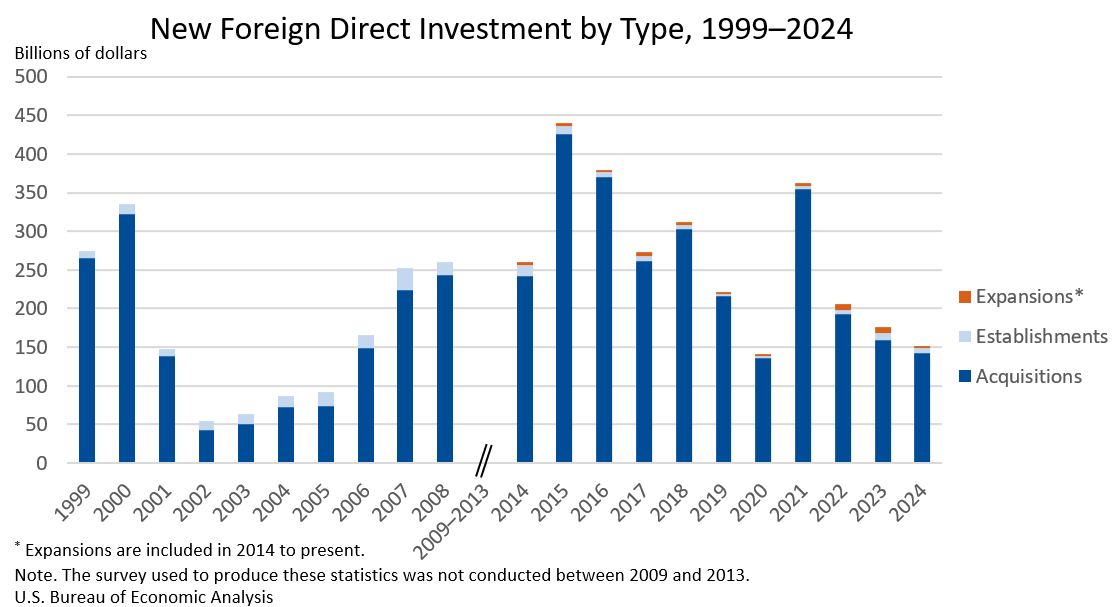Bureau of Economic Analysis
New Foreign Direct Investment in the United States, 2024
Expenditures by foreign direct investors to acquire, establish, or expand U.S. businesses totaled $151.0 billion in 2024, according to preliminary statistics released today by the U.S. Bureau of Economic Analysis. Expenditures decreased $24.9 billion, or 14.2 percent, from $176.0 billion (revised) in 2023 and were below the annual average of $277.2 billion for 2014–2023. As in previous years, acquisitions of existing U.S. businesses accounted for most of the expenditures.
Principal Federal Economic Indicators
Noteworthy
- 2025 News Release Schedule
- Innovation at BEA
- 2025 Annual Updates
- New! Services Trade Data for More Countries
- Data Tool: Trade in Value Added
- Distribution of State Personal Income
- Updated: RIMS II Regional Multipliers
- Arts and Culture
- Space Economy
- FDI Now in State BEARFACTS
- Quick Guide: Price Indexes
The Latest
Value of Both U.S. Assets and U.S. Liabilities Increased in Second Quarter 2014
The U.S. net international investment position was -$5,445.1 billion (preliminary) at the end of the second quarter of 2014 as the value of U.S. liabilities exceeded the value of U.S. assets. At the end of the first quarter, the net position was -$5,511.7 billion (revised).
U.S. International Investment Position, 2nd quarter 2014
The U.S. net international investment position at the end of the second quarter of 2014 was -$5,445.1 billion (preliminary) as the value of U.S. liabilities exceeded the value of U.S. assets (chart 1, table 1). At the end of the first quarter of 2014, the net position was -$5,511.7 billion (revised). The $66.6 billion increase in the net position reflected a $913.2 billion increase in the value of U.S. assets and an $846.7 billion increase…
Travel and Tourism Spending Turned up in the Second Quarter of 2014
Real spending on travel and tourism turned up in the second quarter of 2014, increasing at an annual rate of 2.1 percent after decreasing 1.1 percent (revised) in the first quarter of 2014. Real gross domestic product (GDP) also experienced an upturn, increasing 4.2 percent (second estimate) in the second quarter after decreasing 2.1 percent in the first quarter. All major categories, with the exception of “traveler accommodations”…
Travel and Tourism Satellite Accounts, 2nd quarter 2014
Real spending on travel and tourism turned up in the second quarter of 2014, increasing at an annual rate of 2.1 percent after decreasing 1.1 percent (revised) in the first quarter of 2014. Real gross domestic product (GDP) also experienced an upturn, increasing 4.2 percent (second estimate) in the second quarter after decreasing 2.1 percent in the first quarter. All major categories, with the exception of “traveler accommodations”…
U.S. Current-Account Deficit Decreases in Second Quarter 2014
The U.S. current-account deficit-the combined balances on trade in goods and services, income, and net unilateral current transfers – decreased to $98.5 billion (preliminary) in the second quarter of 2014 from $102.1 billion (revised) in the first quarter of 2014. As a percentage of U.S. GDP, the deficit decreased to 2.3 percent from 2.4 percent. The previously published current-account deficit for the first quarter was $111.2 billion.
Second Quarter 2014 Travel and Tourism Spending Data to Be Released Sept. 18
Statistics on what Americans and foreigners spent on travel and tourism in the United States in the second quarter of 2014 will be released Thursday, Sept. 18 by the Bureau of Economic Analysis (BEA).
The statistics, part of BEA’s Travel and Tourism Satellite Accounts, provide a breakdown of the various components of travel and tourism spending, including lodging, meals, air travel, and shopping. The statistics will also provide data…
U.S. International Transactions, 2nd quarter 2014
Sarah P. Scott: (202) 606-9286 (Data)
U.S. International Transactions: Second Quarter 2014
Widespread Growth Across Metropolitan Areas
Real GDP increased in 292 of the nation’s 381 metropolitan areas in 2013, led by widespread growth in finance, insurance, real estate, rental, and leasing; nondurable-goods manufacturing; and professional and business services.
Gross Domestic Product by Metropolitan Area, 2013 (advance estimate) and Revised 2001 - 2012
Advance 2013, and Revised 2001–2012 GDP-by-Metropolitan-Area Statistics
Real GDP increased in 292 of the nation's 381 metropolitan areas in 2013, led by widespread growth in finance, insurance, real estate, rental, and leasing, nondurable-goods manufacturing, and professional and business services, according to new statistics released today by the U.S. Bureau of Economic Analysis. Natural resources and mining also spurred strong growth in…
Gross Domestic Product for American Samoa, 2013
This release is available as a PDF download.




